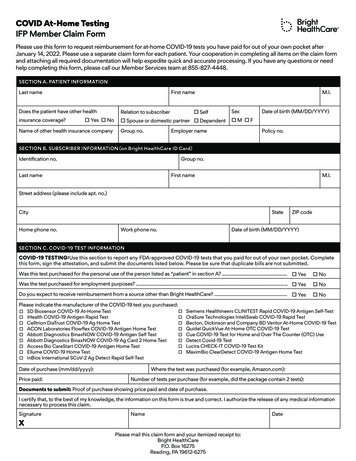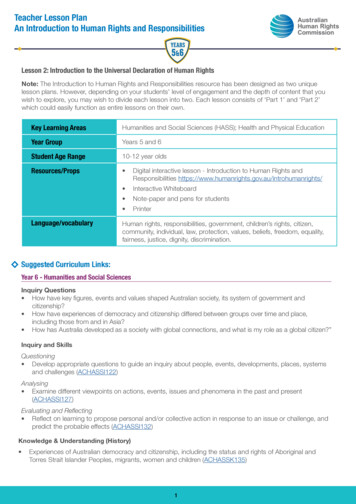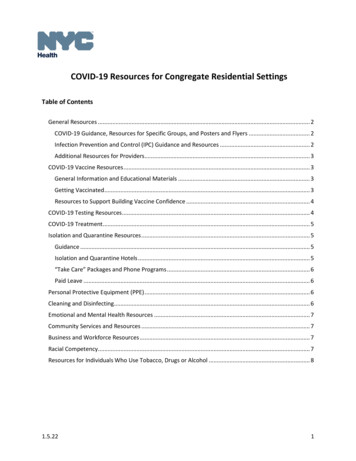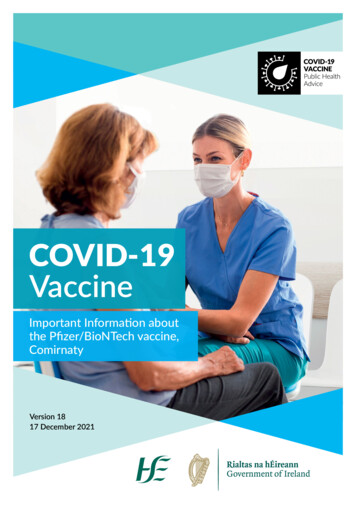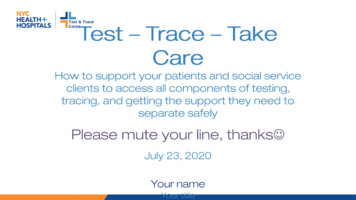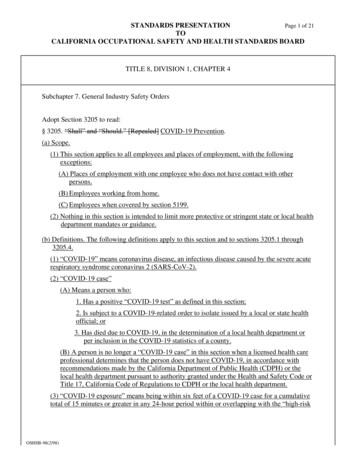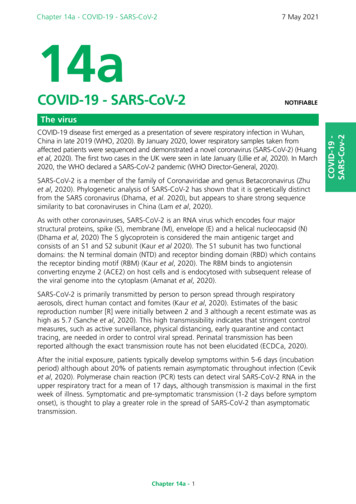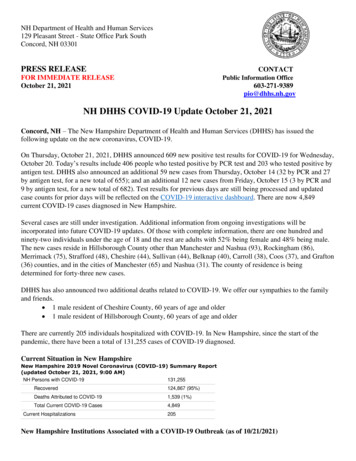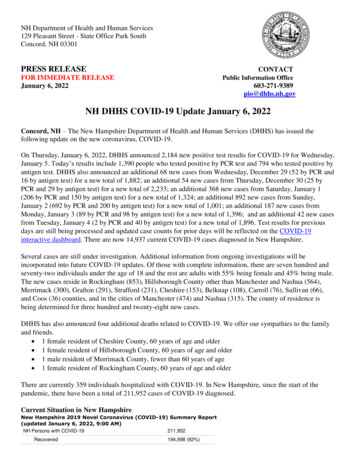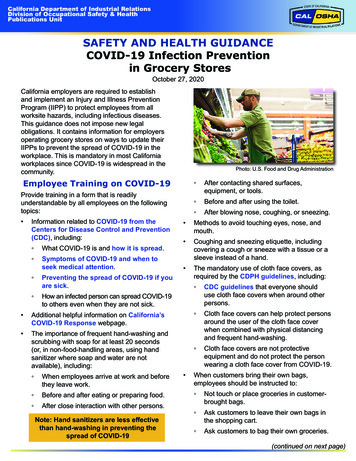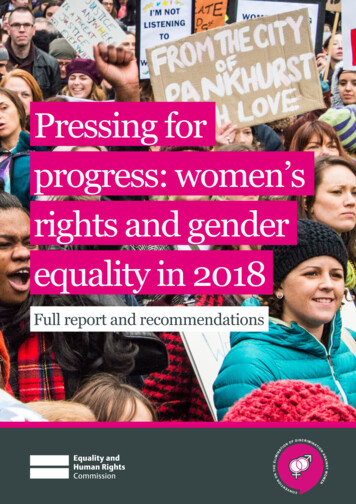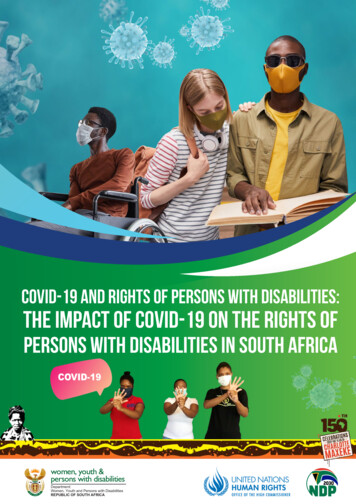
Transcription
COVID-19 and rights of persons with disabilities:The impact of COVID-19 on the rights ofpersons with disabilities in South AfricaCOVID-19women, youth &persons with disabilitiesDepartment:Women, Youth and Persons with DisabilitiesREPUBLIC OF SOUTH AFRICACOVID-19 and Rights of Persons with Disabilities 3
Final report submitted by Dr Emma McKinney7 May 2021Lead researcher’s contact detailsDr Emma McKinneyTel: 083 347 9374Email emma@disabilityincluded.co.zaPeriod during which the review was conductedNovember 2020 to March 20214 COVID-19 and Rights of Persons with Disabilities
CONTENTSACRONYMSEXECUTIVE SUMMARY1.STUDY BACKGROUND1.1 Study framework1.2 Main focus2.LITERATURE REVIEW2.1Introduction2.2Disability-inclusive COVID-19 responses2.3Background to disability in South Africa2.4South African COVID-19 situation2.5Persons with disabilities at a higher risk2.6Thematic areas2.6.1Access to health2.6.2Inaccessible transportation2.6.3Inaccessible built environment2.6.4Access to education2.6.4.1South African educationalchallenges2.6.4.2School closure2.6.4.3School re-opening2.6.5Access to information2.6.6Access to social services2.6.7Access to safety and security2.6.7.12.6.8South Africa16161719202122Access to livelihoods andeconomic cipation and consultation(design and implementation period)232.6.10 Access to quarantine and isolationsites, identified screening and testingsites and other COVID-19 specific facilities24COVID-19 and Rights of Persons with Disabilities 5
3.RESEARCH METHODS264.FINDINGS364.1Background to participants364.2Access to health524.3Access to education614.3.1Learners with disabilities614.3.2Students with disabilities in higher education744.4Access to information754.5Access to social services794.6Access to safety and security834.7Access to livelihoods andeconomic opportunities4.8Participation and consultation(design & implementation period)4.9RECOMMENDATIONS5.194Access to quarantine and isolationsites and other COVID-19 specific facilities5.87101106Acknowledgement and involvementof persons with disabilities1065.2Inclusion in planning1075.3Developing partnerships1075.4Provisioning of resources1075.5Providing accessible COVID-195.6information and support108Higher level recommendations1096.CONCLUSION1137.STUDY STRENGTHS AND LIMITATIONS1168.IMPLICATIONS OF THE STUDY1179.ACKNOWLEDGEMENTS11910. REFERENCES6 COVID-19 and Rights of Persons with Disabilities120
ACRONYMSCBRCommunity Based RehabilitationCPCerebral PalsyCOGTAThe Department of Cooperative Governance and Traditional AffairsDBEDepartment of Basic EducationDoEDepartment of EducationDoHDepartment of HealthDSDDepartment of Social DevelopmentDPODisabled People’s OrganisationsDSDDepartment of Social DevelopmentDWYPDDepartment of Women, Youth and Persons with DisabilitiesECDEarly Childhood DevelopmentEELCEqual Education Law ClinicICUIntensive Care UnitIEDInclusive Education DirectorateNCCCNational Coronavirus Command CouncilNCIDNational Institute for Communicable DiseasesNDMANational Disaster Management ActNDMCNational Disaster Management CommitteeNGONon-Governmental OrganisationsOCDObsessive Compulsive DisorderOTOccupational TherapyPDBEProvincial Department of Basic EducationPPEPersonal Protective EquipmentROSA Regional Office for Southern AfricaSAPSSouth African Police ServiceSASSASouth African Social Security AgencySASLSouth African Sign LanguageSOPSchool Operating ProceduresTORTerms of ReferenceUNUnited NationsUNCRPDUnited Nations Convention on Rights of Persons with DisabilitiesUNHCHRUnited Nations High Commissioner for Human RightsWHOWorld Health OrganizationCOVID-19 and Rights of Persons with Disabilities 1
EXECUTIVE SUMMARYAccording to various national and international policies on the rights of persons withdisabilities, persons with disabilities need to have access to healthcare, educationand employment opportunities, and during periods of healthcare emergencies andpandemics these rights should be protected and accommodated (UN, 2020; WHO;2020; DSD; 2011). The limiting or denial of these rights is in direct contradiction withthe Bill of Rights found within the Constitution of the Republic of South Africa, whichstates that all persons have equal rights to, among other things, healthcare, educationand employment. Limiting or denying these rights is also in direct contradiction withthe United Nations Convention on the Rights of Persons with Disabilities (UNCRPD),which South Africa has signed and ratified.Even when the world is not experiencing a global pandemic, persons with disabilitieshave greater healthcare needs and are more likely to experience poor health comparedto persons without disabilities (Ned et al, 2020). In order to provide relevant and suitableaccommodations and healthcare, persons with disabilities and their representative2 COVID-19 and Rights of Persons with Disabilities
organisations need to be consulted and involved in all plans and policies (McKinneyet al, 2020). During the current COVID-19 pandemic healthcare crisis, the need hasbecome even more urgent as there are life-threatening consequences. The main focusof this study was to examine the impact of the COVID-19 pandemic on the human rightsof persons with disabilities in South Africa. The following thematic areas were used togather data: Access to health; access to education; access to information; access tosocial services; access to safety and security; access to livelihoods and economicopportunities; participation and consultation (design and implementation period); andaccess to quarantine and isolation sites and other COVID-19 specific facilities.Participants in this study included adults, students and children with disabilities; parentsof children and adults with disabilities; and organisations supporting persons withdisabilities such as disabled people’s organisations, non-governmental organisationsand government departments. Of the participants, 50% identified as male; 48% asfemale and two percent as non-binary. Participants in this study represented thefollowing demographics: 31% identified as being Coloured, 30% as being Black/African,29% White, five percent Indian/Asian, while five percent of participants preferred notto disclose their race group. The youngest participant was 3 years old and oldest was78 years old. Participants came from all nine of South Africa’s provinces. A total of192 participants were included in this study and data was collected via 114 completedsurveys, four focus group discussions with 114 participants, and 17 individual interviews.Due to COVID-19, face-to-face interviews and focus group discussions were limited tothe one province that had the lowest COVID-19 infections at that time, while all otherswere conducted via online platforms and cell phones.The voices of persons with disabilities need to be heard to ensure that their humanrights are not overlooked or excluded during future pandemic provisioning. The findingsfrom this study showed that while there were a few positive stories and experiencesshown during the COVID-19 pandemic in South Africa, the rights of many personswith disabilities are being denied or limited. These include the rights to healthcare,communication, education, safety and security, and employment. The findings fromthis study specifically revealed that many participants experienced difficulties followingmandatory COVID-19 guidelines such as social distancing and wearing of PPE;accessing healthcare including therapy, medication, specialist care and assistivedevices; communication and care from healthcare workers; accessing education forchildren and students with disabilities, especially those enrolled in special schools and inschool hostels; being able to access COVID-19 information, social services, and safetyand security; employment opportunities; inaccessible transportation and transportationchallenges; and in the lack of consultation and involvement in COVID-19 design andCOVID-19 and Rights of Persons with Disabilities 3
implementation programmes and policies, including quarantine and isolation sites andother COVID-19 specific facilities.After the study was conducted, the findings were shared with stakeholders at avalidation workshop for disability reports that was held online on the 17th of March2021. Stakeholders included the Disability Sector (the Presidential Working Group onDisability; South African Disability Alliance), Provincial Governments (Limpopo, NorthWest, Northern Cape, Gauteng, Free State, Western Cape and Eastern Cape withapproximately 80% representation), National Departments (with approximately 80%representation); and three representatives from the United Nations Agencies andPartners (UNDP & OHRCHR). Based on the feedback received, additional clarificationwas made and information included.The stories provided by participants in this study need to be read and acknowledged,and government departments need to understand the many challenges, some of whichare life-threatening, that persons with disabilities face. Government departments needto consult with persons with disabilities as they implement strategies to accommodatepersons with disabilities. This will help to ensure that they have human rights on apar with those of persons without disabilities. It is hoped that the findings will providepolicymakers and other stakeholders in South Africa and around the globe with anawareness of persons with disabilities in future pandemics, as it highlights the needfor the inclusion of persons with disabilities in all future policy and procedure decisionmaking. This is in line with the disability movement’s slogan, ‘nothing about us withoutus’, which is especially pertinent considering that the implications of such decisionmaking can have life and death consequences.4 COVID-19 and Rights of Persons with Disabilities
1STUDYBACKGROUNDCOVID-19 and Rights of Persons with Disabilities 5
STUDY BACKGROUNDThe Office of the United Nations High Commission for Human Rights (OHCHR) RegionalOffice for Southern Africa (ROSA) provides technical assistance on the promotion andprotection of human rights to 14 countries in southern Africa, including South Africa.The Regional Office, which is based in Pretoria, focuses on protecting civic space,early warning and prevention, human rights risk analysis, human rights in humanitarianaction, tackling gender-based violence and discrimination, integrating human rights indevelopment, strengthening national protection systems, reporting on human rightsand following up on recommendations by human rights mechanisms.In the context of OHCHR’s work on the rights of persons with disabilities, OHCHRprovides support to the South African Department for Women, Youth and Persons withDisabilities (DWYPD) in researching the impact of COVID-19 on the rights of personswith disabilities in South Africa.The researcher carried out research, data collection, information gathering, in-depthanalysis, report writing and producing infographics on the impact of COVID-19 onpersons with disabilities in South Africa.The researcher, Dr Emma McKinney, is a Senior Lecturer and researcher at theUniversity of the Western Cape, as well as the owner of Disability Included CC who wasawarded the tender to complete this study. Dr McKinney is a person with a disabilityherself, and personally collected and collated the data pertaining to the impact of theCOVID-19 pandemic on the human rights of persons with disabilities in South Africa.This included data on their gender and youth dimensions, and was collected from avariety of data sources that included focus group discussions and individual interviews,as well as telephonic, online and email surveys administered within institutional settingsvia disability organisations as well as other networks.The researcher also examined policy interventions and positive practices recordedin terms of inclusion of persons with disabilities in the response to COVID-19 bygovernment, organisations of persons with disabilities, service providers and/or otherstakeholders. Finally, the researcher held a validation meeting where the researchreport was shared with relevant stakeholders. The researcher reported directly to boththe OHCHR’s ROSA and the DWYPD.6 COVID-19 and Rights of Persons with Disabilities
1.1 Study frameworkThe underlining framework of this study follows a social model view of disability. Thisview suggests that persons with disabilities are disabled by the barriers within societyand not by their impairment (Oliver, 2013; Shakespeare, 2017). In line with this view,the definition of persons with disabilities used in this study include ‘those who havelong-term physical, mental, intellectual or sensory impairments, which, in interactionwith various barriers, may hinder their full and effective participation in society on anequal basis with others’ (United Nations Convention on the Rights of Persons withDisabilities [UNCRPD], 2006, p.4).1.2 Main focusThe main focus of this study was to examine the impact of the COVID-19 pandemicon the human rights of persons with disabilities in South Africa. The following thematicareas, taken directly from the terms of reference (TORs), were used to gather data:1. Access to health2. Access to education3. Access to information4. Access to social services5. Access to safety and security6. Access to livelihoods andeconomic opportunities7. Participation and consultation(design and implementation period)8. Access to quarantine and isolation sitesand other COVID-19 specific facilitiesCOVID-19 and Rights of Persons with Disabilities 7
2LITERATUREREVIEW8 COVID-19 and Rights of Persons with Disabilities
LITERATURE REVIEWThis section of the report includes previously published work including policyinterventions and responses to COVID-19, policy briefs and other documents bygovernment, organisations of persons with disabilities, service providers and otherstakeholders. It also includes literature from peer-reviewed journal articles relating topersons with disabilities and COVID-19 that have been published both locally in SouthAfrica and internationally.2.1 IntroductionAn estimated 15% of the global population, equating to more than one billion people,currently live with a disability and prevalence rates are set to rise (World HealthOrganization and World Bank, 2011). In developing countries, this number is expectedto be higher due to factors including undernutrition, poor health, a lack of access toeducation and healthcare, and challenging environments that can lead to a greater riskof disability (McKinney et al, 2020; Ned et al, 2020). Studies have shown that there isa strong correlation between disability, poverty and rurality, and that these significantlyincrease barriers to accessing healthcare, rehabilitation services, education andemployment (Ned et al, 2020; Vergunst, 2016; Vergunst et al, 2017).People with disabilities, even under usual circumstances, experience poorer access toservices and are among the most vulnerable in any crisis-affected community. Personswith disabilities are more likely to live in poverty and to experience higher rates ofviolence, neglect and abuse (Kuper et al, 2020; WHO, 2020). Due to inequalities invarious sectors including education, employment, transport, and access to healthcare,some persons with disabilities are already vulnerable because of their disability. Assuch, they may require greater care and consideration. In crisis situations, personswith disabilities tend to be excluded from emergency and pandemic responses aswell as in allocating relief resource considerations, as evidenced by previous cases ofpandemics such as Ebola, swine flu, cholera (McKinney et al, 2020; Sabatello et al,2020).According to the World Health Organization, COVID-19 is impacting societies acrossthe globe at their very core, deepening pre-existing inequalities, increasing threats andfurther compounding in inequalities experienced both directly and indirectly (2020).COVID-19 and Rights of Persons with Disabilities 9
2.2 Disability-inclusive COVID-19 responsesAs the COVID-19 pandemic spread across the globe, international organisationsincluding the United Nations (UN) and the World Health Organization (WHO), publishedpolicy briefs and documents that call for the inclusion of persons with disabilities inCOVID-19 responses and recovery (WHO, 2020; UN, 2020).The WHO published Disability Considerations During the COVID-19 Outbreak inMarch 2020. This document described additional considerations that were needed forpersons with disabilities during the COVID-19 outbreak. It included actions needed toensure that persons with disabilities would be able to access the healthcare services,water and sanitation services and public health information that they required. Thedocument detailed the specific actions the various stakeholders should take during thepandemic. These stakeholders included persons with disabilities and their households,governments, disability service providers in the community, institutional settings, andmembers of the community.Actions for persons with disabilities and their households included reducing potentialexposure to COVID-19; putting plans in place to ensure continuation of the care andsupport needed; preparing households for the instance that COVID-19 was contracted;and maintaining the mental and physical health of household members and caregivers.Actions for governments included ensuring accessibility of public health information andcommunication; undertaking targeted measures for persons with disabilities and theirsupport networks; undertaking targeted measures for disability service providers in thecommunity; increasing attention given to persons with disabilities living in potentiallyhigh-risk settings of developing the disease; and ensuring that emergency measuresincorporate the needs of persons with disabilities. Actions for healthcareincludedensuring that COVID-19 healthcare is accessible, affordable and inclusive; anddelivering telehealth services for persons with disabilities.Actions for disability service providers in the community included developing andimplementing service continuity plans; communicating frequently with persons withdisabilities and their support networks; reducing potential exposure to COVID-19 duringprovision of disability services in the community; and providing sufficient support forpersons with disabilities who have complex needs.10 COVID-19 and Rights of Persons with Disabilities
Actions for institutional settings included reducing potential exposure to COVID-19;preparing for COVID-19 infections in institutions; providing sufficient support forresidents with disabilities; and guaranteeing the rights of residents during the COVID-19outbreak.Actions for the community included basic protection measures to be adopted bythe general public; flexible work arrangements and infection control measures to besupported by employers; increased access to stores to be provided by store ownersfor vulnerable populations; and extra support to be provided by family, friends andneighbours for a person with a disability (WHO, 2020).The UN’s Policy Brief: A Disability-Inclusive Response to COVID-19 was publishedin May 2020. The policy brief identifies four overarching areas of action: ensuringmainstreaming of disability in all COVID-19 response and recovery together with targetedactions; ensuring accessibility of information, facilities, services and programmes inthe COVID-19 response and recovery; ensuring meaningful consultation with andactive participation of persons with disabilities and their representative organisationsin all stages of the COVID-19 response and recovery; and establishing accountabilitymechanisms to ensure disability inclusion within the COVID-19 response (UN, 2020).2.3 Background to disability in South AfricaAccording to the South African census of 2011, which used questions that were basedon the Washington Group questions, the disability prevalence rate was 7.5% (2,870,130 persons with disabilities) of the total South African population (Statistics SouthAfrica, 2014).When it comes to the protection and rights of persons with disabilities, South Africa’soverarching framework remains the Constitution of the Republic of South Africa (1996),which states in the Bill of Rights that ‘Everyone is equal before the law and has theright to equal protection and benefit of the law.’ The Constitution further states that noperson or body, including the State and private companies, may unfairly discriminatedirectly or indirectly against any person on one or more grounds including race,gender, colour, age or disability. South Africa has also signed and ratified internationallaws and agreements relating to the protection and rights of persons with disabilities.These include the United Nations Convention on the Rights of Persons with Disabilities(UNCRPD) of 2006. South Africa ratified this in 2007, meaning that the country acceptsall the legal obligations that are imposed by this convention. The UNCRPD seeksCOVID-19 and Rights of Persons with Disabilities 11
to promote, protect and ensure the full and equal enjoyment of all human rights bypersons with disabilities. The UNCRPD Article 11- Situations of risk and humanitarianemergencies, outlines that:States Parties shall take, in accordance with their obligations under internationallaw, including international humanitarian law and international human rightslaw, all necessary measures to ensure the protection and safety of personswith disabilities in situations of risk, including situations of armed conflict,humanitarian emergencies and the occurrence of natural disasters.In line with the domestication of the UNCRPD, the White Paper on the Rights of Personswith Disabilities, including the implementation matrix, was launched in 2015. ThisWhite Paper provides clear policy directives, implementation methods and guidelinesfor government to roll out programmes and projects that promote and protect the rightsof persons with disabilities (Department of Social Development, 2015).The Disaster Management Act, 2002(Act No. 57 of 2002)The Disaster Management Act, 2002 (Act No. 57 of 2002) specifically provides for theprotection of vulnerable communities and households. Vulnerability in the context ofdisaster management legislation means ‘the conditions determined by physical, social,economic, and environmental factors or processes, which increase the susceptibilityof a community to the impact of hazards’. This definition encompasses personswith disabilities. In accordance with the Disaster Management Act (2002), DisasterManagement Centres across the spheres of government are compelled to undertake riskassessments and implement prevention and mitigation measures including assessingthe vulnerability of communities and households (and persons with disabilities) todisasters that may occur. The act also allows Disaster Management Centres acrossthe spheres of government to give advice and guidance by disseminating informationregarding disaster management in the municipal area, especially to communities thatare vulnerable to disasters (including persons with disabilities).2.4 South African COVID-19 situationOn 15 March 2020, South Africa’s president declared a national lockdown. In accordancewith the National Disaster Management Act, 2002 (Act, 2002 No. 57 of 2002), theSouth African government issued regulations on measures to prevent and combat the12 COVID-19 and Rights of Persons with Disabilities
spread of the novel coronavirus. These regulations were amended to include othermatters regarding the protection and safety of people during the lockdown. Regulation11B (7) published in Government Gazette No. 43199, Government Notice No. R446of 2 April 2020, issued in terms of the Disaster Management Act, 2002 (Act No. 57 of2002), stated that:Any Cabinet member may, after consultation with Ministers of CooperativeGovernance and Traditional Affairs and Justice and Correctional Services,issue directions which fall within his or her line functions to provide for furtherconditions that will apply to activities referred to in sub-regulation (1), or otheractivities provided for in these Regulations, for the protection and safety ofany person, including essential workers from COVID-19, provide reasonablemeasures for persons with disabilities and may vary the directions as thecircumstances require.Currently, the National State of Disaster under COVID-19 lockdown has been extendedto 15 April 2021.Since then, COVID-19 positive cases have continued to rise on a daily basis. As ofthe 6th of May 2021, 1,590,370 positive cases of COVID-19 have been identified,with 54,620 deaths having been reported. However, South Africa is anticipated to bemoving towards a third wave and the number of infections is forecasted to increasesignificantly (National Institute for Communicable Diseases [NICD] 2021). While thereported number of COVID-19 recoveries currently sits at 1,511,905 some people mayhave or continue to have significant health conditions (including lung damage, chronicfatigue and strokes), some of which may result in disabilities as a result of previousCOVID-19 infection.2.5 Persons with disabilities at a higher riskPersons with disabilities may be at greater risk of contracting COVID-19 because ofvarious factors including: barriers to implementing basic hygiene measures; difficultyin enacting social distancing because of additional support needs or because they areinstitutionalised; the need to touch things to obtain information from the environmentor for physical support; barriers to accessing public health information. In addition,persons with disabilities may be at greater risk of developing severe disease if theybecome infected because of a pre-existing health condition underlying the disability;and barriers to accessing healthcare. However, the barriers facing persons withdisabilities can be minimised or reduced if key stakeholders take appropriate action(McKinney et al, 2020; Ned et al, 2020; WHO, 2020).COVID-19 and Rights of Persons with Disabilities 13
2.6 Thematic areasThe literature included in this section of the report is arranged into the followingeight thematic areas as they relate to persons with disabilities both globally and inSouth Africa: access to health; access to education; access to information; accessto social services; access to safety and security; access to livelihoods and economicopportunities; participation and consultation; and access to quarantine and isolationsites and other COVID-19 specific facilities.2.6.1 Access to healthIn general, persons with disabilities have greater healthcare needs and are morelikely to develop health-related complications compared to persons without disabilities(McKinney et al, 2020; Ned et al, 2020). Even prior to COVID-19, persons with disabilities,especially those in low-income countries, experience multiple challenges accessinghealthcare. These challenges include a lack of accessible transportation; availabilityof healthcare and rehabilitation services; inadequate medication and equipment; highcosts associated with medication and equipment; communication challenges includinga lack of South African Sign Language (SASL) interpretation services for persons whoare Deaf1; negative staff attitudes and behaviour towards certain disability categoriessuch as persons with intellectual and learning disabilities; and questioning of the worthand value of surgical treatment due to discriminatory judgements about quality of lifefor some persons with disabilities (Ali et al, 2015; Eide et al, 2015; Vergunst et al, 2015;2017).According to Eide et al (2015), a lack of healthcare access for persons with disabilitiesjeopardises the Millennium Development Goals targets set by United Nations. TheUNCRPD, the World Disability Report, the Sustainable Development Goals (SDGs),the World Health Organization (WHO), and in South Africa, the Bill of Rights within theConstitution of the Republic of South Africa, all state that healthcare is a basic humanright and that persons with disabilities should have equal rights in accessing healthcare(Eide et al, 2015; McKinney et al, 2020).In March 2020, the World Health Organization(WHO) published Disability Considerations During the COVID-19 Outbreak whichprovides clear guidelines to various stakeholders including governments. Heregovernments were encouraged to ensure that all clinics providing testing and services1 The word ‘Deaf’ has been capitalised and represents persons who use signlanguage as their primary means of communication and identify as members of the Deaf community.14 COVID-19 and Rights of Persons with Disabilities
related to COVID-19 were fully accessible to persons with disabilities. Physical barriersincluding uneven pathways and surfaces, stairs, hard-to-reach spaces or difficult touse equipment, needed to be addressed so that persons with disabilities could accesshealthcare facilities. In addition, attitudinal barriers including social stigma againstdisability and the denial of essential services needed to be addressed so that personswith disabilities had equal access and provisioning of healthcare.2.6.2 Inaccessible transportationThroughout Africa, the majority of public transport such as trains, buses and minibustaxis remain inaccessible to persons with disabilities. This directly impacts on the abilityof persons with disabilities to seek employment, receive an education and accesshealthcare thus creating economic, educational and health barriers (Vergunst et al,2015; 2017). The lack of accessible transportation specifically negatively impacts onthe ability of persons with disabilities to access healthcare services such as COVID-19screening and testing sites, to obtain medication and receive therapeutic interventions,and to be admitted to cli
the United Nations Convention on the Rights of Persons with Disabilities (UNCRPD), which South Africa has signed and ratified. Even when the world is not experiencing a global pandemic, persons with disabilities have greater healthcare needs and are more likely to experience poor health compared to persons without disabilities (Ned et al, 2020).
